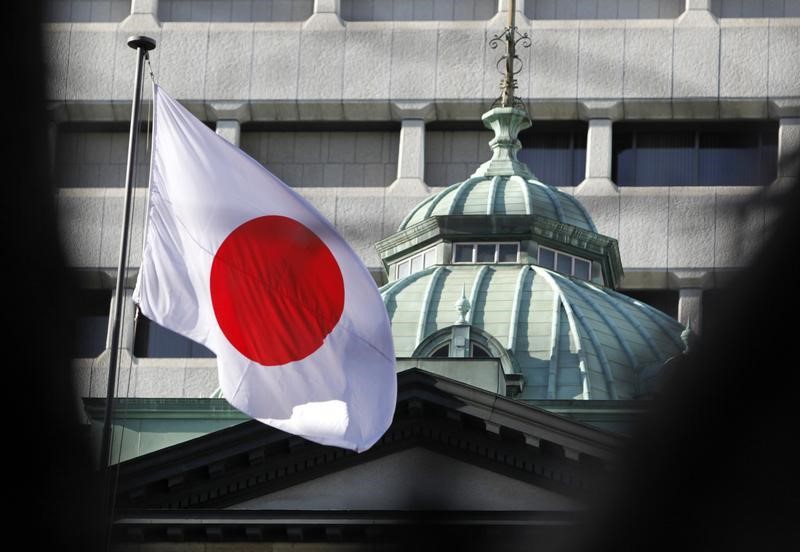Investing.com-- The Bank of Japan kept interest rates at historical lows on Tuesday and left its yield curve control policies unchanged, but slightly lowered its inflation outlook for fiscal 2024.
The BOJ left its short-term interest rates at negative 0.1%, and said it will maintain its yield curve control mechanism in allowing 10-year yields to fluctuate in a range of negative 1% to 1%, with a target of 0%.
The central bank also offered no changes to its asset purchase programs, and said it will continue with its quantitative easing programs.
The BOJ said in an announcement on Tuesday that it expects consumer price index (CPI) inflation to keep trending above its 2% annual target through fiscal 2024, and that inflation will only begin easing by fiscal 2025.
But a majority of the BOJ's policy board members lowered their CPI inflation forecasts for fiscal 2024. Median forecasts for core CPI inflation- which excludes fresh food prices- were now at 2.4% in 2024, down from the bank's October forecast of 2.8%.
Core CPI in fiscal 2025 is expected between 1.6% and 1.9%, down slightly from prior forecasts of 1.6% to 2%, although the median forecast rose slightly to 1.8% from 1.7%. BOJ policymakers also forecast underlying CPI inflation in a tighter range for 2025.
The softer near-term outlook for inflation comes amid a sustained decline in Japanese inflation in recent months. But the BOJ said that this decline will be limited, as service costs remain high and past increases in import prices are baked into the economy.
Focus now turns to an upcoming press conference with Governor Kazuo Ueda later in the day, for more cues on the BOJ's plans to tighten policy.
Ueda had recently said he saw no immediate need to change the BOJ’s dovish stance, amid signs of easing inflation and languid wage growth. Economic uncertainty in the wake of a devastating earthquake at the beginning of the year was also expected to spur the BOJ into maintaining ultra-loose monetary conditions, especially amid more government spending on rebuilding efforts.
While the BOJ is still expected to eventually begin tightening its ultra-dovish policy in 2024, broader consensus is for tightening to take place only by the second quarter of 2024, when the bank will have much more economic data to make a decision.
Any interest rate hikes will bring an end to nearly a decade of ultra-loose monetary policy, marking a new era for the Japanese economy as it begins to track tighter monetary conditions across the globe.
Japanese stocks- particularly the Nikkei 225 index, rallied to 34-year highs, reaching levels last seen before the burst of a massive speculative bubble in the 1990’s, as traders welcomed the prospect of ultra-loose policies.
But the yen suffered from a persistently dovish BOJ, especially as a gulf between local and U.S. interest rates widened. The Japanese currency was among the worst-performing major global currencies in 2023, with this weakness extending into the new year.
Tokyo consumer price index data due later this week will be a key point of focus for markets and policymakers, especially in the wake of the BOJ's altered outlook on inflation.
Upgrade your investing with our groundbreaking, AI-powered InvestingPro+ stock picks. Use coupon INVPRO2024 to avail a limited time discount on our Pro and Pro+ subscription plans. Click here to know more, and don't forget to use the discount code when checking out!
